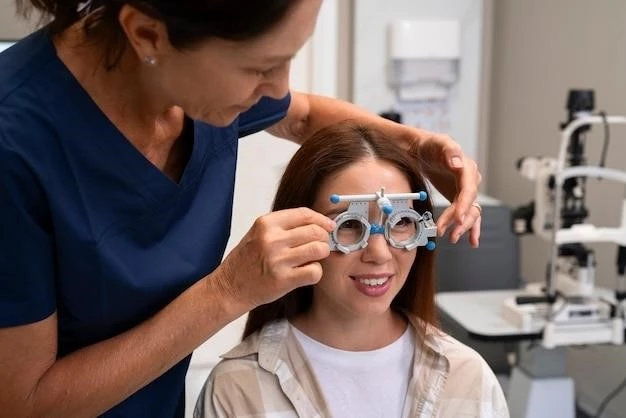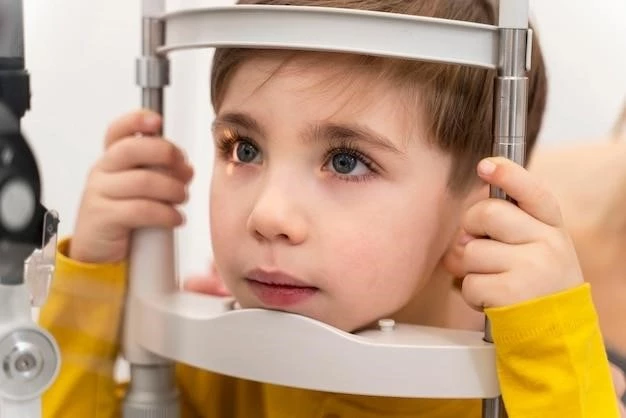Lenz Microphthalmia Syndrome
Introduction to Lenz Microphthalmia Syndrome
Lenz microphthalmia syndrome is a rare genetic disorder that affects various parts of the body․ Individuals with this syndrome typically present with a combination of eye abnormalities, developmental delays, limb abnormalities, and intellectual disability․ This condition was first described by Klaus Lenz in 1955 and is characterized by microphthalmia, which is an abnormally small eye․
Microphthalmia refers to the condition where one or both eyes are abnormally small and underdeveloped․ In Lenz microphthalmia syndrome, the small size of the eyes can result in vision problems․ Apart from eye abnormalities, individuals with this syndrome may also experience hearing loss, speech delay, and other developmental delays․
It is essential to understand that Lenz microphthalmia syndrome is a complex condition that can vary widely in its presentation․ Some individuals may have more severe manifestations of the syndrome, while others may have milder symptoms․ Due to its rarity, early diagnosis and intervention are crucial in managing the challenges associated with this syndrome․
Individuals with Lenz microphthalmia syndrome often require a multidisciplinary approach to care, involving various healthcare professionals such as geneticists, ophthalmologists, developmental pediatricians, and therapists․ The management of this condition focuses on addressing the specific needs of each individual to optimize their quality of life and overall well-being․
While Lenz microphthalmia syndrome poses significant challenges to affected individuals and their families, advances in medical interventions, genetic testing, and early intervention services have improved the outcomes for those living with this condition․ With appropriate medical care, tailored therapies, and ongoing support, individuals with Lenz microphthalmia syndrome can lead fulfilling lives and achieve their full potential․
Signs and Symptoms of Lenz Microphthalmia Syndrome
Lenz microphthalmia syndrome is characterized by a range of signs and symptoms that can vary in severity from person to person․ The most prominent feature of this syndrome is microphthalmia, which refers to abnormally small eyes․ Individuals with this condition may have one or both eyes affected by microphthalmia․
In addition to microphthalmia, individuals with Lenz microphthalmia syndrome may exhibit other eye abnormalities, such as coloboma (a gap in the structures of the eye), cataracts, and other structural defects․ These eye abnormalities can contribute to vision problems and may require interventions such as corrective lenses or surgery to improve vision․
Aside from eye abnormalities, individuals with Lenz microphthalmia syndrome may experience developmental delays, including delays in motor skills, speech and language development, and cognitive abilities․ Some individuals may also have intellectual disability, which can range from mild to severe․

Furthermore, limb abnormalities are common in individuals with Lenz microphthalmia syndrome․ These abnormalities can affect the structure and function of the limbs, leading to challenges with movement and coordination․ Limb abnormalities may vary and can include missing fingers or toes, webbed fingers or toes, or joint contractures․
Hearing loss is another potential symptom of Lenz microphthalmia syndrome․ Individuals with this condition may have varying degrees of hearing impairment, which can impact their ability to communicate and interact with others․ Regular hearing evaluations and interventions such as hearing aids may be necessary to address hearing loss․
Speech delay is also a common feature of Lenz microphthalmia syndrome․ Children with this syndrome may have difficulty with speech sound production, language comprehension, and expressive language skills․ Speech therapy can be beneficial in improving communication skills and enhancing overall quality of life for individuals with this syndrome․
Given the wide range of signs and symptoms associated with Lenz microphthalmia syndrome, a comprehensive approach to care that addresses the specific needs of each individual is essential․ Early detection, diagnosis, and intervention can help optimize outcomes for individuals with this rare genetic disorder․
Causes and Genetic Basis
Lenz microphthalmia syndrome is primarily caused by genetic mutations that affect the development of various body structures, particularly the eyes․ This rare condition is inherited in an autosomal dominant manner, which means that a mutation in one copy of the gene is sufficient to cause the disorder․
The genetic basis of Lenz microphthalmia syndrome involves mutations in the BCOR gene located on chromosome 19․ The BCOR gene provides instructions for producing a protein that plays a critical role in regulating gene expression during development․ Mutations in this gene disrupt normal development processes, leading to the characteristic features of the syndrome․
Most cases of Lenz microphthalmia syndrome result from de novo mutations, meaning that the genetic change occurs sporadically in the affected individual and is not inherited from either parent․ However, in some instances, the mutation may be inherited from a parent who also carries the mutated gene․
It is important to note that individuals with Lenz microphthalmia syndrome have a 50% chance of passing the mutated gene onto their children․ Genetic counseling and testing are essential for individuals with a family history of the syndrome to understand the risks of passing the condition to future generations and make informed decisions about family planning․
Research into the genetic basis of Lenz microphthalmia syndrome continues to deepen our understanding of the disorder and may lead to new insights into potential treatments or interventions in the future․ By unraveling the molecular mechanisms underlying this rare condition, scientists and healthcare providers can work towards developing targeted therapies that address the underlying genetic abnormalities․
Although the specific genetic mutations associated with Lenz microphthalmia syndrome have been identified, the full spectrum of how these mutations lead to the diverse signs and symptoms of the syndrome is still being elucidated․ Ongoing research efforts are focused on uncovering the intricate relationship between genetic changes and the resulting clinical manifestations of the disorder․
By studying the causes and genetic basis of Lenz microphthalmia syndrome, researchers hope to improve diagnostic methods, expand treatment options, and ultimately enhance the quality of life for individuals affected by this rare genetic disorder․
Diagnosis and Genetic Testing
Diagnosing Lenz microphthalmia syndrome involves a thorough clinical evaluation, including a review of the individual’s medical history, physical examination, and assessment of symptoms․ The presence of characteristic features such as microphthalmia, eye abnormalities, developmental delays, and limb abnormalities can raise suspicion of the syndrome․
Genetic testing plays a crucial role in confirming a diagnosis of Lenz microphthalmia syndrome․ Molecular genetic testing, specifically targeted gene sequencing of the BCOR gene on chromosome 19٫ can identify mutations associated with the syndrome․ Genetic testing may also help determine whether the mutation is inherited or occurs sporadically․
In cases where a de novo mutation is identified, genetic testing of the parents may be recommended to assess the risk of recurrence in future pregnancies․ Genetic counseling is an integral part of the diagnostic process, providing individuals and families with information about the inheritance pattern of the syndrome and guidance on family planning decisions․
Other diagnostic tests may be performed to evaluate the extent of organ involvement and complications associated with Lenz microphthalmia syndrome․ These tests may include imaging studies of the eyes and limbs, hearing evaluations, developmental assessments, and other specialized tests based on the individual’s symptoms․
Early diagnosis of Lenz microphthalmia syndrome is essential for initiating timely interventions and support services to address the specific needs of affected individuals․ A multidisciplinary approach to care, involving healthcare professionals from various specialties, can help optimize outcomes and enhance the quality of life for individuals living with this rare genetic disorder․
Diagnostic advances, including next-generation sequencing technologies and comprehensive genetic panels, have improved the accuracy and efficiency of diagnosing rare genetic conditions like Lenz microphthalmia syndrome․ These tools enable healthcare providers to identify specific genetic mutations quickly and accurately, leading to more personalized treatment strategies․
By incorporating genetic testing into the diagnostic process for Lenz microphthalmia syndrome, healthcare providers can tailor management strategies to the individual’s unique genetic profile․ This personalized approach allows for targeted interventions that address the underlying genetic abnormalities and optimize outcomes for affected individuals;
Medical Interventions for Lenz Microphthalmia Syndrome
Medical interventions for individuals with Lenz microphthalmia syndrome aim to address the specific symptoms and complications associated with the disorder․ The management of this rare genetic condition typically involves a multidisciplinary approach that coordinates care across multiple specialties․
Ophthalmologic interventions play a central role in the treatment of Lenz microphthalmia syndrome, given the prominent eye abnormalities in affected individuals; Surgical procedures, such as corrective eye surgery for microphthalmia or coloboma, may be recommended to improve vision and enhance the cosmetic appearance of the eyes․
Individuals with Lenz microphthalmia syndrome may benefit from ongoing eye care and monitoring to address potential complications such as cataracts, glaucoma, or retinal abnormalities․ Regular ophthalmologic evaluations are essential for detecting and managing eye-related issues in a timely manner․
Depending on the severity of developmental delays and intellectual disability, individuals with Lenz microphthalmia syndrome may require supportive therapies and interventions․ Physical therapy, occupational therapy, and speech therapy can help improve motor skills, enhance independence, and address communication challenges․
Hearing loss, a common feature of Lenz microphthalmia syndrome, may necessitate interventions such as hearing aids or assistive listening devices․ Regular audiologic evaluations are important for monitoring hearing function and implementing appropriate accommodations to support individuals with hearing impairment․
Genetic counseling and family support services are integral components of medical interventions for individuals with Lenz microphthalmia syndrome․ Genetic counselors provide information about the genetic basis of the syndrome, inheritance patterns, and available testing options to help individuals and families make informed decisions․
Additional medical interventions may be recommended based on the individual’s specific needs and symptoms․ Coordination of care among various healthcare providers, including geneticists, pediatricians, neurologists, and therapists, is essential for delivering comprehensive and integrated care for individuals with Lenz microphthalmia syndrome․
Advancements in medical technologies and treatment modalities continue to expand the therapeutic options available for managing rare genetic disorders like Lenz microphthalmia syndrome․ Tailored medical interventions that address the unique needs of affected individuals can lead to improved outcomes and enhance their quality of life․
Early Intervention and Special Education
Early intervention and special education play a critical role in supporting individuals with Lenz microphthalmia syndrome in reaching their full potential and optimizing their developmental outcomes․ Early identification of the syndrome and prompt initiation of intervention services are key components of a comprehensive care plan․
Early intervention services for children with Lenz microphthalmia syndrome may include developmental assessments, physical therapy, occupational therapy, speech therapy, and educational support․ These services are designed to address the specific developmental delays and challenges that individuals with the syndrome may experience․
Physical therapy can help improve motor skills, strength, and coordination in individuals with limb abnormalities or mobility issues․ Occupational therapy focuses on enhancing the individual’s ability to perform daily activities and develop independent living skills․ Speech therapy targets communication difficulties and supports language development․
Special education services are tailored to meet the unique learning needs of individuals with Lenz microphthalmia syndrome․ This may involve an individualized education plan (IEP) that outlines specific goals, accommodations, and support services to ensure optimal academic progress and social development․
Early intervention programs provide a supportive environment for children with Lenz microphthalmia syndrome to develop essential skills, build confidence, and foster independence․ These programs emphasize a holistic approach to care that addresses the physical, cognitive, social, and emotional aspects of development․
Collaboration among parents, healthcare providers, educators, and therapists is critical in designing and implementing early intervention and special education plans for individuals with Lenz microphthalmia syndrome․ A team-based approach ensures that interventions are coordinated, consistent, and effective in addressing the individual’s needs․
Individuals with Lenz microphthalmia syndrome may benefit from assistive technologies, adaptive equipment, and classroom accommodations to support their learning and maximize participation in educational settings․ Specialized educational strategies tailored to the individual’s strengths and challenges can enhance academic success․
By emphasizing early intervention and providing specialized educational support, individuals with Lenz microphthalmia syndrome can enhance their overall development, improve their quality of life, and achieve greater independence․ These tailored interventions help individuals with the syndrome navigate challenges and reach their full potential․
